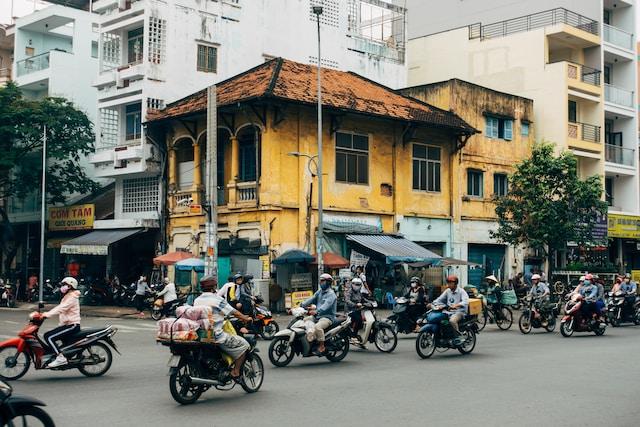Vietnamese idioms and proverbs play a significant role in the language, reflecting the rich cultural heritage and wisdom of the Vietnamese people. In this comprehensive guide, we will explore common Vietnamese idioms and proverbs, delve into their meanings, and unravel their cultural significance. By understanding these expressions, learners of Vietnamese can deepen their language skills and gain insights into the Vietnamese way of thinking. Let’s dive into the fascinating world of Vietnamese idioms and proverbs!
This is part 4 of our series on the Vietnamese language. Feel free to check our introduction to the Vietnamese language, our introduction to Vietnamese phonetics and pronunciation and our list of 50 essential phrases for everyday use.
Top 15 Vietnamese Idioms:
- “Ăn quả nhớ kẻ trồng cây” – “When eating fruit, remember the one who planted the tree.”
Meaning: Acknowledge and appreciate the efforts of those who have helped you.
Example: After winning the award, she thanked her mentors and said, “Ăn quả nhớ kẻ trồng cây.” - “Trèo cao đáng sợ, trườn thấp chết ngay” – “Climbing high is scary, crawling low leads to death.”
Meaning: Taking risks can be dangerous, while playing it safe may result in missed opportunities.
Example: He decided to pursue his dream of starting a business, believing in the saying “Trèo cao đáng sợ, trườn thấp chết ngay.” - “Chết cười” – “Dying of laughter.”
Meaning: Something is extremely funny.
Example: The comedian’s performance had the audience “chết cười” throughout the show. - “Nói xa như mùa” – “Talk as far as the season.”
Meaning: Making promises or plans that are unlikely to be fulfilled.
Example: Don’t trust his promises; he tends to “nói xa như mùa.” - “Buồn cười ra nước mắt” – “Laughing until tears flow.”
Meaning: Finding something extremely amusing or hilarious.
Example: The comedy show was so funny that the audience was “buồn cười ra nước mắt.” - “Từ trong giặc ra đâu quân ta” – “Our soldiers are found even within the enemy’s ranks.”
Meaning: Our own people can be found in unexpected places, serving our interests.
Example: The spy infiltrated the enemy’s camp, proving the proverb “Từ trong giặc ra đâu quân ta.” - “Lưỡi hỏi đuôi bắt” – “The tongue asks, the tail catches.”
Meaning: One’s words or actions can have consequences.
Example: He spread false rumours about his colleague and soon faced the consequences of “Lưỡi hỏi đuôi bắt.” - “Đậu xanh rau má” – “Green beans and pennywort.”
Meaning: Used to describe a couple deeply in love or a perfect match.
Example: They are like “đậu xanh rau má,” always seen together and deeply in love. - “Chớ thấy sóng cả mà ngã tay chèo” – “Don’t let go of the oars just because you see the waves.”
Meaning: Persevere and keep going despite challenges or difficulties.
Example: In the face of adversity, he held onto the oars, believing in “Chớ thấy sóng cả mà ngã tay chèo.” - “Hai mắt một mí” – “Two eyes, one eyelid.”
Meaning: Describes two people who are inseparable or always together.
Example: They are like “hai mắt một mí,” always seen together and inseparable. - “Trống vỡ chầu đổ” – “The drum is broken, and the platform is collapsed.”
Meaning: Describes a situation where everything falls apart due to one small mistake.
Example: The project failed because of a minor error, resulting in “trống vỡ chầu đổ.” - “Thắng chung được thua riêng” – “Winning together, losing individually.”
Meaning: Describes a situation where people share success but face failure alone.
Example: In a team, they celebrate victories together but experience “thắng chung được thua riêng” individually. - “Một miếng trầu chẳng làm nên non” – “One betel leaf cannot make a hill.”
Meaning: Highlighting the importance of collective effort and collaboration.
Example: In a team, they believe that “một miếng trầu chẳng làm nên non” and work together to achieve success. - “Cái khó ló cái khôn” – “Difficulties make you smarter.”
Meaning: Challenges and obstacles can lead to personal growth and wisdom.
Example: Despite facing hardships, she believed that “cái khó ló cái khôn” and emerged stronger. - “Ăn bằng lần, nói bằng năm” – “Eat in a meal, speak in a year.”
Meaning: Actions speak louder than words.
Example: He believed in “ăn bằng lần, nói bằng năm” and let his actions reflect his intentions.
Top 19 Vietnamese Proverbs
- “Cái răng cái tóc là góc con người” – “Teeth and hair are the corners of a person.”
Meaning: One’s appearance plays a significant role in forming impressions.
Example: She always takes good care of her appearance, believing in the proverb “Cái răng cái tóc là góc con người.” - “Học trò lấy lớp” – “The student learns from the class.”
Meaning: Students learn not only from the teacher but also from their peers.
Example: In a collaborative learning environment, “học trò lấy lớp” is an essential principle. - “Chửa cháy mới lo làm lò” – “When the fire is burning, worry about the stove.”
Meaning: Address immediate concerns first before taking on additional tasks.
Example: He focused on completing urgent assignments before taking up new projects, following the proverb “Chửa cháy mới lo làm lò.” - “Đường đến trường học” – “The road to school.”
Meaning: Education is a lifelong journey.
Example: The professor emphasized the importance of continuous learning, saying that “Đường đến trường học” never ends. - “Nuôi con khôn, đừng nuôi con ngoan” – “Raise your child to be wise, not obedient.”
Meaning: Encourage independent thinking and intelligence in children rather than blind obedience.
Example: The parents believed in the proverb “Nuôi con khôn, đừng nuôi con ngoan” and nurtured their child’s critical thinking skills. - “Học hỏi tuổi già, đi đầu đời trẻ” – “Learn from the old in order to lead the young.”
Meaning: Seek wisdom and guidance from elders to guide the younger generation.
Example: The company’s founder emphasized the proverb “Học hỏi tuổi già, đi đầu đời trẻ” in mentoring young employees. - “Không thấy mùi, không bán” – “No scent, no sale.”
Meaning: If something does not stand out or have any special qualities, it won’t attract attention or sell well.
Example: The product lacked unique features, so the sales were poor – as they say, “Không thấy mùi, không bán.” - “Cái khó ló cái khôn” – “Difficulties teach wisdom.”
Meaning: Challenging situations provide opportunities to gain knowledge and wisdom.
Example: After facing many obstacles in her career, she realized the truth in the proverb “Cái khó ló cái khôn.” - “Được mắng đánh chớ hổ danh” – “Don’t be ashamed of being scolded and hit.”
Meaning: Constructive criticism can lead to self-improvement and success, so one should not be ashamed of receiving it.
Example: The coach always pushed the players hard, believing in the motto “Được mắng đánh chớ hổ danh.” - “Con hư tại cha, mẹ” – “A spoiled child is the fault of the parents.”
Meaning: Parents are responsible for their children’s behaviour and upbringing.
Example: The unruly behaviour of the child reflected the lack of discipline at home – truly “Con hư tại cha, mẹ.” - “Chớ thấy sóng cả mà ngã tay chèo” – “Don’t fall off the boat when you see big waves.”
Meaning: Don’t give up or lose hope when facing challenges or difficulties.
Example: Despite the turbulent times, he remained steadfast and held onto the belief “Chớ thấy sóng cả mà ngã tay chèo.” - “Tốt gỗ hơn tốt nước sơn” – “Good wood is better than good paint.”
Meaning: Substance and quality are more important than appearances and superficial qualities.
Example: He chose durability and functionality over aesthetic appeal, as he believed “Tốt gỗ hơn tốt nước sơn.” - “Ở một chỗ mà chín sự” – “Stay in one place and learn nine things.”
Meaning: Focusing on a single task or area allows for deeper learning and expertise.
Example: The master craftsman emphasized the proverb “Ở một chỗ mà chín sự” to his apprentice. - “Chậm mà chắc” – “Slow but sure.”
Meaning: Taking the time to do things carefully and accurately leads to better results.
Example: He followed the principle “Chậm mà chắc” in his work, ensuring quality and precision. - “Ăn quả nhớ kẻ trồng cây” – “When eating fruit, remember the one who planted the tree.”
Meaning: Show gratitude and appreciation to those who have helped or supported you.
Example: As she enjoyed the success of her business, she remembered the proverb “Ăn quả nhớ kẻ trồng cây.” - “Sau mưa trời lại sáng” – “After the rain, the sky clears up.”
Meaning: Difficult times will pass, and better days will come.
Example: Despite the challenges they faced, they held onto the belief that “Sau mưa trời lại sáng.” - “Có chí thì nên, có nên thì mới tới” – “Where there’s a will, there’s a way.”
Meaning: Determination and perseverance are essential for achieving success.
Example: He faced many obstacles, but with the motto “Có chí thì nên, có nên thì mới tới,” he overcame them all. - “Bình tĩnh là vàng” – “Calmness is gold.”
Meaning: Maintaining composure and staying calm in difficult situations is highly valued.
Example: In the face of a crisis, her ability to stay calm and think clearly proved the truth in “Bình tĩnh là vàng.” - “Vạn sự khởi đầu nan” – “A thousand endeavors begin with difficulty.”
Meaning: Starting something new is often challenging, but perseverance leads to success.
Example: The entrepreneur reminded himself that “Vạn sự khởi đầu nan” as he embarked on a new venture.
Vietnamese idioms and proverbs encapsulate the cultural values, traditions, and wisdom of the Vietnamese people. By familiarizing yourself with these expressions, you gain deeper insights into the language and the Vietnamese way of life. Whether you are learning Vietnamese for travel, business, or personal growth, understanding and using these idioms and proverbs will enhance your language skills and enable you to connect more deeply with Vietnamese culture. Incorporate them into your conversations and enjoy the richness and beauty of the Vietnamese language.
Remember, as the Vietnamese saying goes, “Thực hành mới biết ngon” – “Only through practice can you know how delicious it is.” So, embrace the language, explore the idiomatic world of Vietnamese, and let it enrich your language journey.

